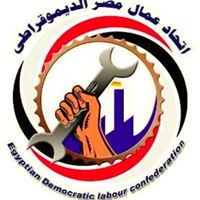
Mohamed Ahmed Salem ? President of the Regional Federation of Independent Unions in Gharbiyya province, which is part of the Egyptian Democratic Labour Congress. From the Union of Workers in Gharbiyya Province local adminstration.
?We took part in collecting signatures for the Rebel campaign in Gharbiyya and our petitions were handed in with others collected by the Centre for Trade Union and Workers? Services. Before 30 June we also participated in public meetings for the campaign in Tanta, Mahalla al-Kubra, Port Sa?id and Minya in Upper Egypt. In Tanta we started our protests two days early, when a new governor from the Brotherhood was appointed. We went down into the streets to oppose his appointment and stayed there until 30 June. People in Tanta are still in the streets even now. Numbers started to build up on 25 June, until by 29 June there were about 10,000 in the streets besieging the provincial government buildings.
Like most Egyptians, we took part in the campaign in protest at the way that Mohamed Morsi used the institution of the presidency in the interests of the Brotherhood alone, and not the interests of the people, and the workers in particular. Just like under the old regime, his policies benefited businessmen and investors, not workers. We?d never seen so many workers lose their jobs, nor so many trade unionists victimised. Some trade unionists in Alexandria, Fayyoum and Assiyut were even sentenced to jail. In Gharbiyya Province we suffered from the independent unions not gaining recognition from management. A number of colleagues in the Rice Mills Company and the Drinking Water Company were taken to court for their trade union activities. But the major reason why there was a crisis between the Brotherhood and the workers was the Brotherhood?s failure to issue the law on trade union freedoms.
Last year the Military Council believed that delivering the country to the Muslim Brotherhood would avoid bloodshed. The army wanted to get away from political battles and return to its core role. But over time, it became clear that developments on the economic, political and social levels were not in the interest of the people or the country and that the situation was becoming a threat to national security. ? The army had to intervene to protect the masses who came out into the streets on 30 June.
We are facing a number of challenges in the current period. Firstly we want to see a new trade union law. Secondly the previous government failed to take back privatised companies where the courts overruled their sale and decreed their return to public ownership. Thirdly we have to get companies which have closed down during the economic crisis working again. Thousands of their workers are suffering from unemployment. Finally we need to stop government interference in trade union work. This is something which the Egyptian working class has suffered from for a long time.
The next president will be elected after the end of a transitional period and after parliamentary elections. From now on we will be organising ourselves to represent workers in the new parliament and to carry their demands and suffering. If workers? demands are still ignored we?ll re-organise, after consulting with the rank-and-file union members.?
What you can do:
Like this:
Loading...
notre dame football Bcs Bowl Chuck Hagel ncaa football CES russell wilson Pokemon
No comments:
Post a Comment
Note: Only a member of this blog may post a comment.